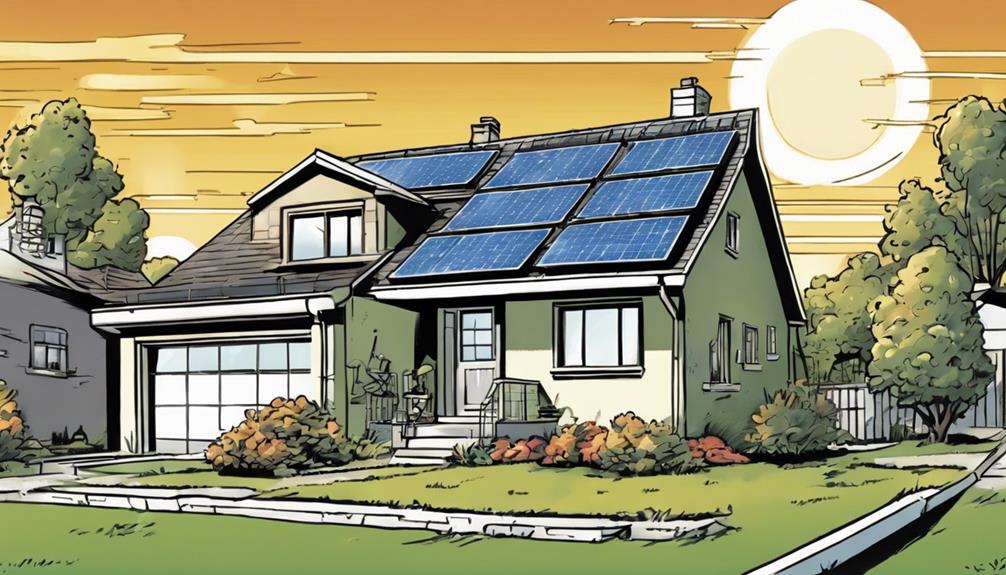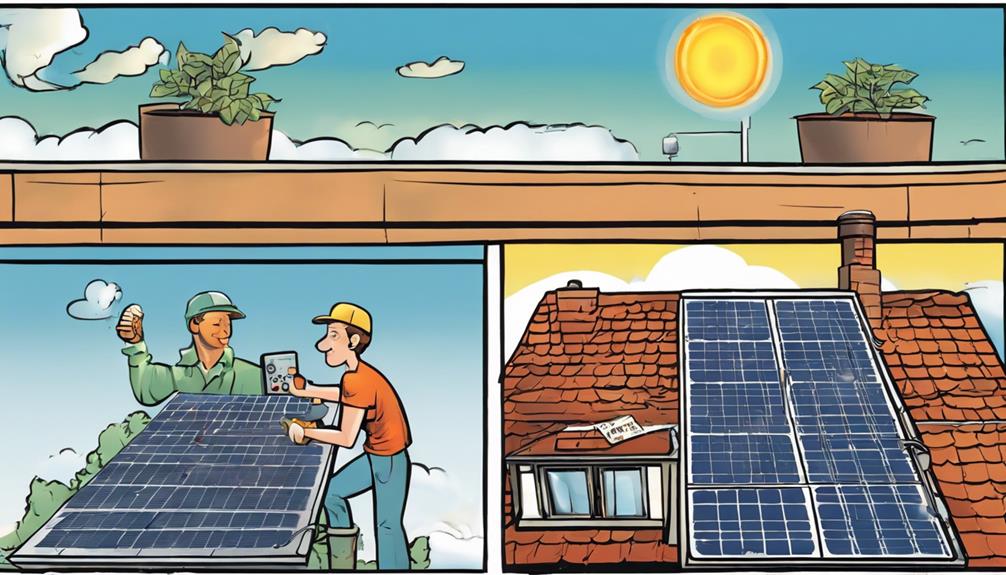You could earn around $0.15 per kWh in California and $0.08 to $0.09 per kWh in other states by selling excess solar energy. This not only brings in extra income but also lets you help the environment and lessen dependence on fossil fuels. Don't miss the chance to maximize your earnings and impact!
Key Takeaways
- Earn around $0.15/kWh in California for surplus solar power.
- Payments range from $0.08 to $0.09/kWh in other states.
- Boost income and reduce reliance on fossil fuels.
- Contribute to a cleaner environment and sustainable future.
- Financial gains, environmental benefits, and community empowerment.
Net Metering Program Overview
Discover how net metering permits you, as a homeowner, to offset your electricity bills by receiving credit for excess solar power production. This program enables you to sell surplus energy back to the grid, effectively spinning your meter both ways and utilizing solar and grid energy interchangeably.
By participating in net metering, solar companies will handle the necessary paperwork, potential meter upgrades, and guarantee automatic crediting by utilities for any surplus energy you generate. It's crucial to mention that net metering policies vary by state, impacting the compensation rates and system size limitations you may encounter.
To maximize your savings through net metering, consider implementing strategies such as adding batteries to store excess energy or syncing your energy usage with peak solar production times. Embracing renewable energy sources like solar power not only benefits the environment but also offers you a practical way to reduce your electricity expenses through net metering.
Solar Energy Income Potential

You can earn around $0.15/kWh in California by selling excess solar power, while in other states, payments range from $0.08 to $0.09/kWh.
Understanding the breakdown of earning potential from selling surplus solar energy will help you maximize your income and make informed decisions about your solar investment.
Income From Solar Surplus
Generating income from surplus solar energy can be a lucrative opportunity for homeowners and businesses looking to maximize the benefits of their solar panel installations. By selling excess solar power back to the grid, you can earn money while contributing to a more sustainable energy system. The income from surplus solar energy varies depending on location and state regulations. In California, for instance, selling excess solar power can earn you around $0.15/kWh, while other states offer payments ranging from $0.08 to $0.09/kWh for solar energy sold back to the grid.
Here is a comparison table showcasing the potential income from selling surplus solar energy in different locations:
| Location | Price per kWh ($) |
|---|---|
| California | $0.15 |
| Texas | $0.09 |
| New York | $0.08 |
| Florida | $0.09 |
| Arizona | $0.08 |
Selling solar energy back to the grid not only benefits you financially but also contributes to a more sustainable future.
Earning Potential Breakdown
When considering the earning potential breakdown of surplus solar energy, understanding how location and state regulations impact the income generated from selling excess solar power back to the grid is vital. Here are some key points to help you grasp the potential earnings:
- Net Metering: Participating in net metering programs allows you to sell excess solar energy back to the grid and receive credits on your electricity bill. This can greatly reduce your overall energy costs.
- Selling Rates: Different states offer varying rates for selling excess solar power. For instance, in California, you can earn approximately $0.15/kWh, while other states may provide payments ranging from $0.08 to $0.09/kWh.
- Solar Investment Tax Credit: Taking advantage of the Solar Investment Tax Credit can further enhance your earnings by allowing you to deduct a portion of the cost of installing a solar energy system from your federal taxes. This incentive can make investing in solar panels more financially rewarding in the long run.
Benefits of Selling Solar Power

Selling solar power not only boosts your income but also contributes to a cleaner environment by reducing reliance on fossil fuels.
By sharing excess energy with your community, you can help promote a sustainable energy future for everyone involved.
The financial gains, environmental benefits, and sense of community empowerment make selling solar power a win-win scenario.
Financial Gains From Solar
You can earn additional income by selling excess solar power back to the grid, providing a financial benefit beyond just saving on your electricity bills.
Here are some key points to take into account:
- Net Metering: In states with net metering policies, you can sell your solar energy back to the grid and earn credits or payments for the excess power you generate.
- Financial Incentives: In California, for instance, you can expect around $0.15/kWh for the surplus solar energy you sell back to the grid. Other states also offer payments ranging from $0.08 to $0.09/kWh for excess solar power.
- Community Programs: Initiatives like Solarize not only help communities afford solar installations but also maximize earnings from selling solar energy.
Even in states without net metering, residents can still earn money by selling excess solar power to utility companies.
Environmental Impact Benefits
Maximizing the sale of excess solar power can greatly contribute to environmental benefits by reducing carbon emissions and promoting sustainability.
By selling surplus energy back to the grid, you're actively participating in the reduction of harmful greenhouse gases that contribute to climate change. This action aligns with the global shift towards renewable energy sources, ensuring a cleaner and more sustainable future for generations to come.
Additionally, the more individuals engage in selling solar power, the more significant the impact on reducing overall carbon emissions. This not only benefits the environment but also leads to improved air quality and a healthier ecosystem.
Community Energy Sharing
Participating in community energy sharing by selling excess solar power back to the grid offers various benefits for both individuals and the environment. When you engage in this practice, you not only contribute to a cleaner energy grid but also reap financial rewards. Here are some key benefits to keep in mind:
- Financial Gain: Selling surplus energy back to the grid can result in monetary compensation, either through direct payments or credits on your utility bill.
- Supporting the Community: By participating in community energy sharing, you help create a more sustainable and resilient energy system for your neighborhood or town.
- SRECs Opportunity: In some states, you can earn additional income through Solar Renewable Energy Certificates (SRECs), adding another layer of financial benefit to your solar energy efforts.
Engaging in community energy sharing not only benefits you as an individual but also plays an essential role in advancing renewable energy adoption and environmental conservation efforts.
Demand for Renewable Energy

The increasing demand for renewable energy sources in Texas, particularly solar energy, is driven by the state's sunny climate and a growing emphasis on environmental sustainability. This surge in interest has led to a rise in installations of large solar systems across the state. Texas, known for its abundant sunshine, provides an ideal environment for solar panel installations, making it a popular choice for renewable energy adoption.
Moreover, the Solar Renewable Energy Certificate (SREC) market in Texas has also contributed to the demand for solar energy. The opportunity to sell excess solar energy back to the grid through SRECs has incentivized many homeowners and businesses to invest in solar panels. This not only allows them to reduce their carbon footprint but also provides an additional source of income.
As Texas continues to prioritize environmental sustainability and renewable energy solutions, the demand for solar energy is expected to further increase, shaping the state's energy landscape towards a more sustainable future.
Financial Aspects of Solar Energy

Curious about the financial benefits of solar energy? Here are some key financial aspects to take into account:
- Net Metering: By utilizing net metering, you can earn credits for any excess solar energy your system produces. These credits can then be used to offset future electricity bills, maximizing your savings.
- Solar Renewable Energy Certificates (SRECs): Selling SRECs can provide an additional source of income for solar energy system owners. The value of SRECs is influenced by the state's solar electricity generation, offering a lucrative opportunity to earn money from your renewable energy production.
- Utility Bills: Solar energy can lead to significant savings on utility bills. By generating your electricity, you can reduce or even eliminate your dependence on traditional energy sources, resulting in lower monthly expenses. This reduction in utility bills can contribute to the overall financial benefits of investing in solar energy.
Maximizing Solar Energy Benefits

To enhance the advantages of solar energy, consider optimizing your system's efficiency through strategic planning and upgrades. Increasing the efficiency of your solar energy system can help maximize your savings and earnings.
Participating in net metering programs or alternative compensation options can also boost your income from selling excess solar power. By taking advantage of these opportunities, you can make money selling your surplus energy back to the grid.
Additionally, investing in a larger solar system can lead to more significant savings on your monthly electric bills over time. The long-term benefits of solar energy include decades of free electricity after the initial installation costs.
For those looking to go off-grid, including batteries in your system can provide added benefits tailored to your personal preferences and energy needs. By optimizing your solar energy setup and exploring different compensation programs, you can make the most out of your investment in solar power.
Commercial Solar Installations Guide

Explore different commercial solar installation options, like rooftop, ground-mounted, carport, canopy, and tracker systems, to harness the benefits of cost savings and energy independence for your business.
When contemplating commercial solar installations, bear in mind the following:
- Advantages: Commercial solar installations offer significant perks, including cost savings, tax incentives, increased property value, environmental impact, and energy independence.
- Factors to Evaluate: Before moving forward with a solar installation, assess factors such as roof condition, available space, local regulations, budget constraints, and energy consumption patterns for optimal efficiency.
- Long-Term Gains: By investing in commercial solar installations, you can experience long-term financial benefits, including reduced utility bills, enhanced property value, environmental sustainability, and decades of free solar energy.
Solar Energy Optimization Tips

Enhance the efficiency of your solar energy system by incorporating regular maintenance and cleaning practices for your solar panels. By ensuring that your panels are free of debris and operating at peak performance, you can maximize energy production.
Additionally, efficient energy storage solutions, such as solar storage batteries, allow you to store excess energy generated during peak sunlight hours for later use when the sun isn't shining. Monitoring your energy consumption patterns and making adjustments based on this data can help you identify areas where you can further improve your energy usage.
Consider upgrading to high-efficiency solar panels to increase the amount of energy your system generates. Furthermore, implementing smart energy management systems can assist in maximizing the benefits of your solar energy setup by enabling you to control and monitor your energy usage more effectively.
Frequently Asked Questions
Do I Get Money Back for Excess Solar Energy?
You do get money back for excess solar energy. The amount you earn varies by location, typically around $0.08 to $0.15 per kilowatt-hour. Selling surplus solar power can provide additional income to offset your electricity costs.
How Much Money Can You Make Selling Solar Energy Back to the Grid?
When you sell solar energy back to the grid, you can earn around $0.08 to $0.15/kWh. This practice not only lowers your bills but also contributes to a cleaner environment by reducing carbon emissions.
How Much Can You Really Make Selling Solar?
You can potentially make a significant income stream by selling excess solar energy back to the grid. The payment rates vary by location, but in California, for instance, you could earn around $0.15/kWh.
Can You Sell Excess Energy From Solar Panels?
You can absolutely sell excess energy from solar panels. It's a great way to earn extra income and offset electricity costs. Depending on your location and utility rates, you could make a significant impact.
Can Excess Solar Energy Generated from Running a Fountain Be Sold for Profit?
Yes, it is possible to run fountain on solar power and generate excess energy that could potentially be sold for profit. By utilizing solar panels to power the fountain, any surplus energy can be redirected back into the grid, earning revenue for the owner.
Conclusion
To summarize, selling excess solar energy can be a profitable venture for homeowners and businesses alike. By participating in a net metering program, you can earn credits or cash for the electricity you generate.
For example, John, a homeowner in California, saved over $500 on his electricity bill in the first year of selling his excess solar power back to the grid.
With the increasing demand for renewable energy, now is the perfect time to maximize your solar energy benefits.









